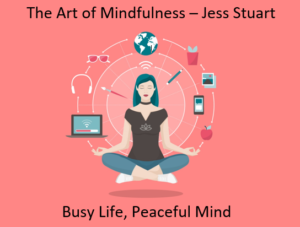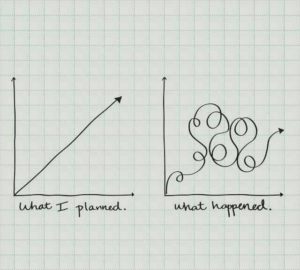3 years ago I quit my corporate job, left my house by the beach and all the material trappings I’d created in search of a different way of life. You see, I’d followed the path to success and when I’d ‘arrived’ I hadn’t actually got to where I thought it’d lead – I wasn’t happy. In fact quite the opposite, I was unfulfilled, tired and unhappy.
Over the course of the next year I travelled the world in search of answers, learned from different cultures and traditions and spent time doing the things I loved to see where that would lead. I made life simpler and I grew happier, I found my authenticity and sense of purpose and what’s more I discovered my passions.
One of which was writing and out of this journey came my first book to share with others what I’d learned. I remember how proud I was when I’d finished the manuscript and when it went to be printed and I chose the cover design. I delighted in signing copies for family and friends and calling myself an author but ironically I thought that writing the book would be the hard part, I thought at this point my job was done! What I hadn’t realised at the time that there was a whole new world about to open up, a world of the business of writing that I needed to learn to navigate and a world that I knew nothing about.
Having learned so much about the business side of writing a book over the last year, looking back there are things I’d liked to have shared with my unpublished self as I set out on this journey and I hope that by sharing it helps others too. I wrote a non fiction, self help book related to wellness and happiness so the advice will likely be different for other genres and especially different for fiction.
Find out more about my book, A Rough Guide to a Smooth Life here www.inspireyourlife.org/book
I wanted to get published but had no platform so despite the agents and publishing houses I submitted my work to (even those who fed back the writing was good), no-one would take a punt on a first time, unknown author with no following. So I had to do it myself and that meant understanding how to market the book and set up my ‘author business’. Here's a few things I learned along the way;
Marketing
Self promotion can be hard for authors, it doesn’t often come naturally. I knew nothing about Marketing when I started and it was one of my least favourite things to do but I set out, step by step, to put the things I was learning into practice and build my business and platform.
When writing a (non fiction) book, platform is so important. Who will buy it unless they know it exists? Marketing what we do is a critical part of this, allowing the message to resonate with people, reaching your target audience and encouraging followers to build that platform. These are people that want to know you, like what you have to say and may buy copies of your book, products you create and may then also talk about this in their own networks.
We all have existing networks and can often overlook this in search of new followers. Leverage your network – we all have one even if it’s just family and friends, get out and connect with the community, talk about what you do, send messages to local groups, get the word out. I now have a monthly newsletter and a mailing list set up in MailChimp and use this to communicate events, blog posts, places to buy the book, encourage people to leave Amazon reviews etc. Sometimes I’d do competitions and give aways or launch a new product this way too – like my online courses and coaching packages.
I had to strike the balance between teaching myself what I didn’t know (the internet is such a great resource for this) whilst paying for some of the stuff I couldn’t do myself (website SEOs for example!) However with the budget being tight I ended up having to learn a lot more than I’d anticipated. I also sought out those who’d gone before, those who were 5 years further down the track and the success I wanted to become. I learned from those people, even the ones I couldn’t meet (with Skype, online tutorials, reading their books etc.). YouTube and Udemy have been invaluable for my education as have countless blogs from those who’ve been there before and made the mistakes I’d like to learn from. Getting the word out I blog but not just for my own site.
I send blogs to other platforms with millions of followers, it was all for free but great exposure and sent traffic towards my website and helped boost my mailing list. It also puts my work in front of far more people than I could ever reach alone. I set up a YouTube channel and recorded short video clips with nice backdrops talking about the same topics I blog on. Not everyone likes to read so having a variety of mediums for your message reaches a different audience and makes it more accessible. I also find blogging helps me try out new ideas and initiates some creativity in my writing. In fact some of my chapters of the book actually include previous blogs I’ve written.
Another way of sharing the message and an offshoot for many authors is speaking. Not often a writer’s favourite thing but necessary if you want to promote the book. Speak anywhere to anyone and even if one person shows up you never know where that might lead. Some of my events have sold out, others have had no-one turn up, it's trial and error and we learn as we go. I also set up a meet up group to form a new network and followers but also a chance to host my own events related to topics within my book and a way of spreading the word and increasing my platform.
Although I hate cold calling I did send off short emails with a link to my website to anyone who I thought might be interested. I’d just explain who I am and what I do, a bit about my book and that because it’d just launched I was speaking for free in a bid to aid my marketing and should they wish to take advantage of this we could discuss dates. I targeted other meet up groups, local community groups, book shops, libraries, yoga studios, Facebook groups and local businesses and conferences that had a similar audience and matching themes to my book.
Setting up as a business
The first thing I did was learn to build a basic website in WordPress. It has an about me page with my photo, a contact form, a page about my book and a blog page which is linked up to my mailing list so each time I blog they get it sent straight to them. There is also a pop up on there to encourage visitors to any page to sign up to the mailing list.
I also got some business cards produced which have my details on one side and my book on the other. Further down the track (quite recently) I also got some professional headshots done to use on my website, biography, promotions material and hopefully the next book!
I learned about social media and got myself onto as many platforms as I could manage; Facebook, Twitter, Pinterest, LinkedIn, Instagram etc. I use these platforms for sharing links to my book, articles and blogs I write, events I’m running and gaining more followers by directing traffic back to my website/mailing list. Sometimes I use boosts to target audiences to promote my book, new products or events. I’ve also found it helpful sharing these things on other Facebook groups for extended networks and promotion but also connecting with those similar to yourself who you can learn from or just networking.
The book launch
When it comes time to launch the book marketing and promotion is key. I set up local free events about the topics of my book so interested people would come to learn; the book was for sale at these events. I used thunderclap to garner support for launch day (a social media campaign to garner support and promote coordinated exposure across platforms). I contacted local press and did interviews with anyone who’ll listen, I also gave free copies of the book for them to use as competition give aways.
I made a book trailer, like a movie trailer, to help spread the message and promote the book upon launching. It’s on YouTube and I can share the link anywhere, I’ve also embedded it in my website and on my Amazon author page etc. Check it out here https://youtu.be/OgKoSLQpUt4.
Sometimes you have to give to get and at first this may seem counter intuitive but I’ve found doing giveaways and competitions great ways of getting coverage and people talking about the book. It seems counter-intuitive when you’re trying to make sales but if you give a sample of your work away for free and people like it they might by a book or they’ll talk about it to their friends who’ll by a book.
Also used this mantra when putting material free online; blogs and video blogs. Samples of my work that’ll do the talking for me should someone be looking at what I do, an example of my work in action and a taster of what they’ll get should they buy the book or any other service. I've given away free copies of my book at special events (for example the one year anniversary of being published) this actually drove more sales at that event than I'd done before, even though I gave 5 copies away for free.
Streams of income
As many writers will attest we write for love not money and whilst it may be true that very few books make a profit I’ve found that from non fiction books often comes other streams of income. From my book came online courses, events, retreats and coaching. At the events people would ask me to come and speak to their business on the same topics, especially mindfulness. So then came the corporate gigs, presentations, workshops and training sessions. My book is a tool to sell my business/work but vice versa my business is a platform for book sales too.
Lessons I learned
It takes time – be patient, Rome wasn’t built in a day and we’re not going to be overnight successes. It’s slow progress every day where we’re building our platform or book sales. I thought once the book was published that would be it, instant success. Building the business that is the book and being an author is like building any business from scratch. It takes time, word has to get out and you build it up from the ground over a few years. So in the early days prepare not to make money, I had a day job to back me up during these times.
Reflect and be proud – quite often with so much to do after the buzz of the launch it can be easy to forget you made it, you published a book, you’re now an author. So keep remembering to hold it in your hand and reflect on your success in getting to this point, all the hard work and here you have a finished book, you’re an author.
It’s a careful balance and sometimes I feel like the business of writing takes time away from my actual writing but in order to sell books and be known I feel like sometimes it’s a necessary evil. I’ll pullback on the business commitments when I begin a new big project, like my next book but also find that sometimes it’s a welcome distraction to do some of these admin jobs on a day when the inspiration is not flowing as I’d like. It doesn’t matter how good a book is, if no-one knows it exists it’ll never get read so marketing is key (love it or hate it) in helping get the word out.
Having done it once I now know so much more that I hope to apply next time around as I contemplate writing book number 2. As a result of my work promoting this book and learning about the business side of writing I am now also a more attractive prospect to a future publisher. I have one book to my name so they know I can do it, I have a following, have built a platform, I know how to market and I know what’s involved in publishing a book.
The others lessons I feel have been important during this journey are that we should never expect that it’s going to be easy. It is all down to us and no-one will do it for us so row your own boat. And most importantly, never give up. It will get tough and there’s times it’ll feel too hard and that everything is failing but if you give up you’ll never know how close you could have been to success and all the work you’ve done to date will be for nothing.
Like many first time writers I’d assumed that once I was published I’d be a best selling author in no time despite everyone telling me writers don’t often make money. The lesson I’ve learned is whilst our books may not make a profit it can lead to other things that do. I also learned that success as a writer for me is less about sales and royalties and more about sharing my message and the people I get to help along the way.
I don't pretend to be an expert (far from it) and am continuously learning in this space but I certainly feel more prepared going into book 2 as a result of what I learned from my experience publishing my first book.



























